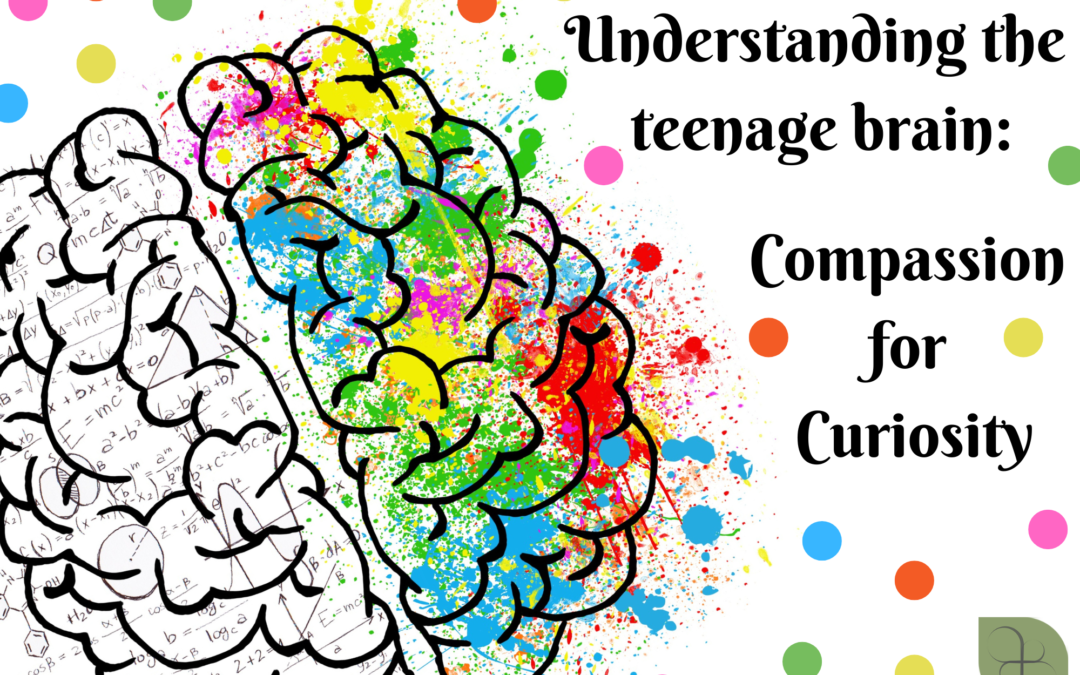Understanding the teenage brain:
Compassion for Curiosity
Adolescents. We all have to go through this time in our lives and honestly, it was probably some of the hardest years I have ever experienced. Lots of changes in the body, school becomes more intense, friends take priority over family, but most importantly there are changes and growth that happen in our brain during this time that makes life hard and emotions intense. This can be particularly hard for parents who are on the receiving end of adolescence. As adults, we can forget that the curiosity and need to push boundaries are also an important part of growing into adulthood and gaining self-awareness. However, during these years, that can be easier to forget than not. My intention for this blog is to provide some support and information for those who are experiencing the ups and downs of teenage life, whether that is for the parent or for the teen.
There are two major things that occur during our adolescence years in our brain: (1) pruning and (2) myelination. This can sound a bit overwhelming at first but let’s quickly break down both of these processes. Pruning involves the reduction of the number of our brain’s basic cells, neurons, and synapses. This process is shaped by our experience and intensifies with stress. In childhood, our brain overproduces neurons and their connections and during this time some pruning does exist, especially when we learn and develop skills. In adolescence, the process of pruning occurs at a more rapid speed, when our brain decides to keep the neurons that we are using and removes the excess ones.
An example to help with this concept: if a child starts to learn to play an instrument when they are young but around age 11 or 12 they no longer play that instrument, it is very likely that during this process of pruning, those neurons associated with playing that instrument will be removed. Simply because they are not being used. Children’s brains are like sponges, they soak up so much information as they begin to learn to walk, talk and move through the world. All of the things their brain picks up will not be needed or used from adolescence on, so they brain does some spring cleaning. On the other side of that, if there are skills that you want your child to have (musical, language, athletic, etc.) it is important to start in childhood and place attention and energy into these activities. The more you use these circuits, the stronger they will be and not be subjected to pruning.
The other major thing that happens during this time is myelination. Myelin is a sheath the covers the membranes among interlinked neurons, allowing for more effective and efficient synchronization of information to flow. As a result, our brain is more equipped to make wiser judgements and look at the overall bigger picture. Our ability to use gist thinking guides us to make decisions based on experience and intuition, rather than reward-driven.
In order to develop gist thinking, we need to have experiences. During adolescence, we seek out reward- based situations that fuel our curiosity of the world, however that doesn’t always mean that they will be the safest options. Take a moment to think about some of the things you did when you were a teenager. If you are shaking your head at some of the risks you took at a teenager, your gist thinking and intuitive wisdom are at work and you may wonder why you did those things; those experiences helped to develop your caution as an adult.
This is not to say that we should let teenagers do whatever they want, in fact statistically speaking, this time period has extremely high rates of accidental injuries and mortality. However, if we can provide a safe place for the teen to express their individual needs and plans, we are allowing a conversation to begin that provides structure, stability and the opportunity for everyone involved to be heard. With the help of parents/ caregivers/ therapist, adolescence can be a time of safe exploration and guidance in learning how to channel this intense curiosity in a more helpful and healthy manner. While you (the parent) provide this space, you may also be surprised what you can learn from your teen. As adults, we tend to lose our drive for creativity and adventure. Channeling some of that energy from your teen can also help to provide a different lens to explore your world as well.
If you would like additional information on the developing mind of a teen, I would highly recommend the book Brainstorm by Daniel Siegel. If you feel that you and/or your teen could benefit from some additional support, finding a therapist could be a solution. This time can be a difficult one, remember you are not alone and support is here!


I needed to thank you for this excellent read!! I definitely loved every little bit of it. Ive got you bookmarked to check out new things you postÖ
Thank you so much for taking time to read this post- glad you enjoyed it!